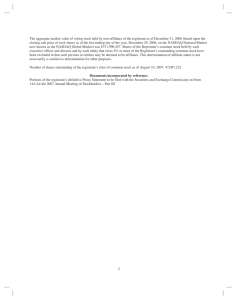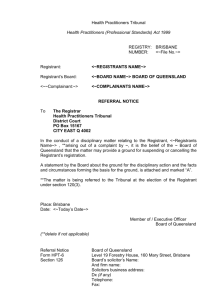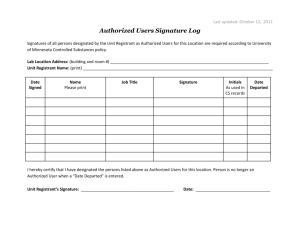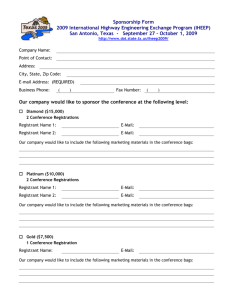00037 (Majority)
advertisement
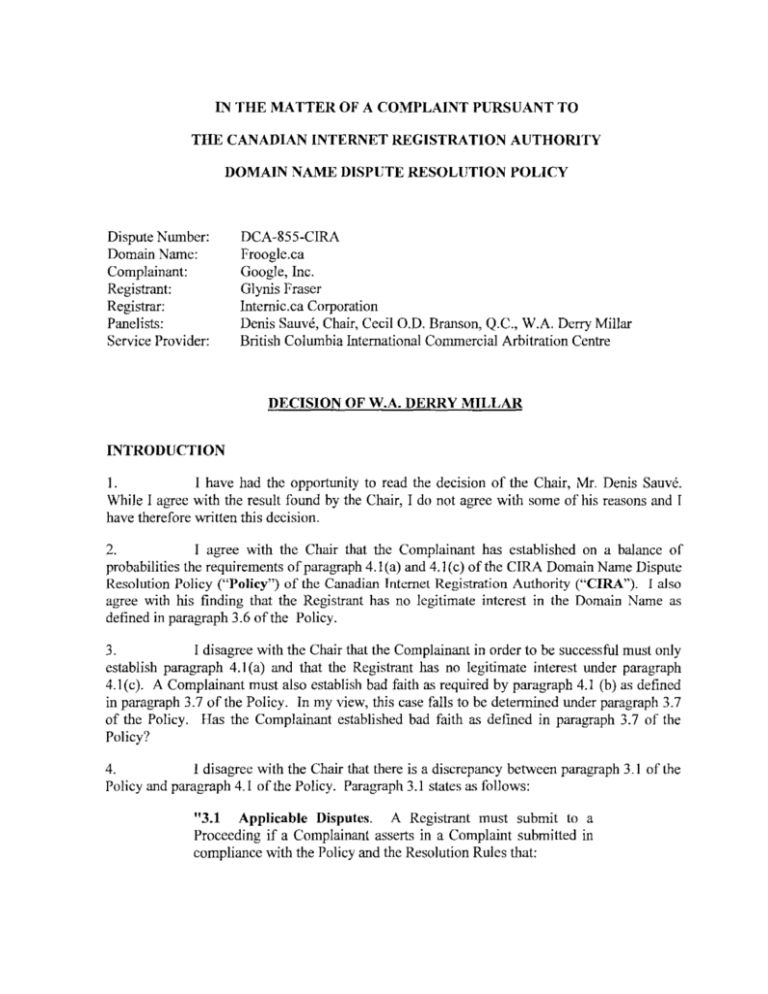
IN THE MATTER OF A COMPLAINT PURSUANT TO THE CANADIAN INTERNET REGISTRATION AUTHORITY DOMAIN NAME DISPUTE RESOLUTION POLICY Dispute Number: Domain Name: Complainant: Registrant: Registrar: Panelists: Service Provider: DCA-855-CIRA Froogle.ca Google, Inc. Glynis Fraser Internic.ca Corporation Denis Sauve, Chair, Cecil O.D. Branson, Q.C., W.A. Derry Millar British Columbia International Commercial Arbitration Centre DECISION OF W.A. DERRY MILLAR INTRODUCTION 1. I have had the opportunity to read the decision of the Chair, Mr. Denis Sauve. While I agree with the result found by the Chair, I do not agree with some of his reasons and I have therefore written this decision. 2. I agree with the Chair that the Complainant has established on a balance of probabilities the requirements of paragraph 4.1(a) and 4.1(c) of the CIRA Domain Name Dispute Resolution Policy ("Policy") of the Canadian Internet Registration Authority ("CIRA"). I also agree with his finding that the Registrant has no legitimate interest in the Domain Name as defined in paragraph 3.6 of the Policy. 3. I disagree with the Chair that the Complainant in order to be successful must only establish paragraph 4.1(a) and that the Registrant has no legitimate interest under paragraph 4.1(c). A Complainant must also establish bad faith as required by paragraph 4.1 (b) as defined in paragraph 3.7 of the Policy. In my view, this ease falls to be determined under paragraph 3.7 of the Policy. Has the Complainant established bad faith as defined in paragraph 3.7 of the Policy? 4. 1 disagree with the Chair that there is a discrepancy between paragraph 3.1 of the Policy and paragraph 4.1 of the Policy. Paragraph 3.1 states as follows: "3.1 Applicable Disputes. A Registrant must submit to a Proceeding if a Complainant asserts in a Complaint submitted in compliance with the Policy and the Resolution Rules that: 2 (a) the Registrant's dot-ca domain name is Confusingly Similar to a Mark in which the Complainant had Rights prior to the date of registration of the domain name and continues to have such Rights; (b) the Registrant has no legitimate interest in the domain name as described in paragraph 3.6; and (c) the Registrant has registered the domain name in bad faith as described in paragraph 3.7. For the purposes of this Policy, the date of registration of a domain name is the date on which the domain name was first registered in the Registry or the predecessor registry operated by the University of British Columbia." 5. Paragraph 3.1 is a list that requires all items to be present in order for the Complaint to qualify as an applicable dispute. The use of the conjunctive "and" indicates that all three items must be present to qualify as a Complaint under the Policy. Grammatically, such a list is read as if there was an "and" after clause (a). The section does not say that a dispute qualifies if only one of the listed items are present_ 6. If the intention of the drafters was that a Complaint could be submitted if any one of the allegations were present, the disjunctive "or" would have been used as it is under paragraph 3.7 — Registration in Bad Faith — where the disjunctive "or" is used as a result of which a Complainant need only prove one of the three types of bad faith in order to succeed. The fact that all three items must be present is made clear by paragraph 4.1. 7. Under paragraph 4.1 of the Policy, the onus is on the Complainant to prove on a balance of probabilities that: "(a) the Registrant's dot-ca domain name is confusingly similar to a Mark in which the Complainant had rights prior to the date of registration of the Domain Name and continues to have such rights; AND (b) the Registrant has registered the Domain Name in bad faith as described in paragraph 3.7; AND the Complainant must provide some evidence that: (c) the Registrant has no legitimate interest in the Domain Name as described in paragraph 3.6." [Emphasis Added] 8. Paragraph 4.1 of the Policy also provides that: "Even if the Complainant proves (a) and (b) and provides some evidence of (c), the Registrant will succeed in the Proceeding if the -3 Registrant proves, on a balance of probabilities, that the Registrant has a legitimate interest in the domain name as described in paragraph 3.6." 9. In my view, the Complainant must establish bad faith as defined in the Policy in order to succeed in its Complaint. I disagree with the Chair on this point. In my view the decision in Diners Club International Ltd. v. Planet Explorer Inc., DCA-733-CIRA, the case relied on by the Chair, is wrong. 10. I do not think that the Complainant needs to plead the words set out in the Policy i.e. "if and only if" and "primarily" in order to found a successful Complaint; although, I agree that it would be wiser to do so. The Complainant must establish the requirements with the evidence it adduces. BAD FAITH - PARAGRAPH 4.1 (b) OF THE POLICY 11. In order to establish bad faith, the Complainant must establish on the balance of probabilities, one of paragraphs 3.7(a), (b) or (c) of the Policy. In my opinion, "bad faith" must be found as defined in the Policy and not as defined at common law or in cases under the ICANN Uniform Dispute Resolution Policy. The Policy is more restrictive. 12. The introductory words of paragraph 3.7 are as follows: "For the purposes of paragraph 3.1(c), a Registrant will be considered to have registered a domain name in bad faith if, and only if." The paragraph then goes on to set out the three types of bad faith. I will deal with the applicable paragraphs below. REGISTRATION IN BAD FAITH - PARAGRAPH 3.7(a) OF THE POLICY 13. With respect to paragraph 3.7(a), the Complainant must establish that: "(a) the Registrant registered the domain name, or acquired the Registration, primarily for the purpose of selling, renting, licensing or otherwise transferring the Registration to the Complainant, or the Complainant's licensor or licensee of the Mark, or to a competitor of the Complainant or the licensee or licensor for valuable consideration in excess of the Registrant's actual costs in registering the domain name, or acquiring the Registration." 14. While the Complainant states in its Complaint that the timing of the registration of the Registrant "froogle.ca " domain name came after the public launch of the Complainant's froogle services, the launch at least from the material was pretty low key. In the material provided to us by the Complainant, the only article from December 11, 2002 is an item posted by someone on December 11, 2002 at 05:23 PM "December 11, 2002: Announcing Froogle!" All 4of the other articles are dated December 12, 2002 and are from various on-line sources. The "froogle.com " website did not become active until December 11, 2002. 15. It is highly suspicious to me that the Registrant would come up with the name "froogle" one day after the launch of "froogle.com " as a new website. 1 find it hard to accept that she and Google came up with the "froogle" name simultaneously even though she says that she did come up with the name approximately one week before December 12, 2002 as noted in Mr. Branson's decision. Both the Registrant and Google state that they came up with the name based on "frugal", I simply do not accept that this was a remarkable coincidence even with the low key announcement noted above. 16. Did the Registrant register the domain name "primarily for the purpose of selling, renting, licensing or otherwise transferring the Registration to the Complainant...". The evidence is that: (a) the Registrant was asked in an email dated February 25, 2003 whether the domain name froogle.ca was for sale and how much she would be willing to part with it for. There is no response to that email provided by the Registrant; (b) the Registrant responded to the first communication she acknowledged receiving from the Complainant, a letter dated March 21, 2003, with an email dated April 1, 2003 which stated: "My name is GLYNIS FRASER (and I am a female). I own the domain name froogle.ca The WHOSIS information is correct, and I am willing to accept offers to sell the domain. Please reply to this email address (personal) with any offers;" (c) the Complainant by email dated April 2, 2003, again demanded the transfer of the domain name and offered to pay the cost of registration; (d) the Registrant by email dated April 4, 2003 replied: "Your offer is not acceptable, but thank you for the Inquiry;" the Registrant was advised by email from the solicitor for the Complainant that he (e) had been contacted by someone on the Registrant's behalf who indicated that she was "asking $25,000 to transfer the domain name." He asked "Could you please verify that is the amount you are seeking." (f) the Registrant by email dated April 23, 2003 replied at 16:52:05: "As per your request. This email is to confirm that the conversation today regarding froogle.ca was done on my behalf, and the offer stands. Let me know of your decision as I wish to update the website soon." -5 (g) the Registrant by email dated April 23, 2003 at 5:37 PM stated: "Yes Dan, the amount is correct and the currency is US. Please do not forget the three Google Lava Lamps;" and (h) by an email dated August 9, 2004, the Registrant was asked if she wished to sell the Domain Name. By emails dated, November 1, 2004, she was offered $300.00 for the Domain Name and on November 2, 2004, $600.00 by the same person. She was also offered $1,500.00 by an email dated May 25, 2005. 17. The question is - can we infer that the ultimate demand for $25,000 from the Complainant was the Registrant's real purpose in registering the Domain Name? In my view, we can. The Registrant's website itself had little content and some of the "recipes" that have been placed on it since this dispute arose are simply filler. In these types of paper hearings without sworn evidence by affidavit or otherwise, one can never have the evidence that one might have at a hearing with evidence under oath_ We must make our decision based on what is the reasonable inference that can be drawn from the conduct of the parties. Here, the Registrant says that she received no communication from the Complainant until she received the Complainant's letter dated March 21, 2003. The Registrant's immediate response was "I am willing to accept offers to sell the domain." In my view, her course of conduct indicates to me that her real or "primary" purpose in registering the Domain Name was to sell, rent or transfer it to the Complainant. REGISTRATION IN BAD FAITH - PARAGRAPH 3.7(b) OF THE POLICY 18. With respect to paragraph 3.7(b), the Complainant must establish that: "(b) the Registrant registered the domain name or acquired the Registration in order to prevent the Complainant, or the Complainant's licensor or licensee of the Mark, from registering the Mark as a domain name, provided that the Registrant, alone or in concert with one or more additional persons has engaged in a pattern of registering domain names in order to prevent persons who have Rights in Marks from registering the Marks as domain names." 19. The evidence in my view does not establish that the Registrant acted in this fashion and accordingly cannot be found to have acted in bad faith under this paragraph. REGISTRATION IN BAD FAITH - PARAGRAPH 3.7(c) OF THE POLICY 20. With respect to paragraph 3.7(c), the Complainant must establish that: "(c) the Registrant registered the domain name or acquired the Registration primarily for the purpose of disrupting the business of the Complainant, or the Complainant's licensor or licensee of the Mark, who is a competitor of the Registrant." 6 21. While the Complainant makes allegations directed to this item in its Complaint, the evidence does not support a finding under this paragraph. ORDER 22. While as noted in this decision, I do not agree with all of the reasons of the Chair, I do agree with him in the result. I join with him in directing that the registration of the Domain Name "froogle.ca " be transferred to the Complainant. Date: August 16, 2005. Date: August , 2005. 1 concur. Cecil O.D. Branson, Q.C.
